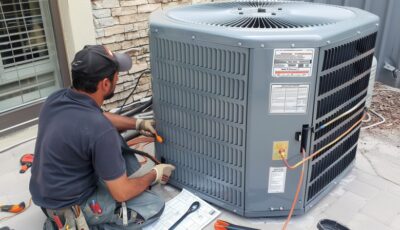
Working with electrical appliances and HVAC systems can be both rewarding and hazardous if not handled correctly. Every year, countless accidents occur due to a lack of proper maintenance or disregard for safety protocols. Ensuring you’re equipped with the right knowledge can make all the difference. Let’s explore some tips and guidelines to keep you safe while maintaining these vital systems in your home or workplace.
Why Safety in Electrical and HVAC Maintenance Matters
Safety is paramount when dealing with electrical and HVAC systems because of the inherent risks. Faulty wiring, leaks, and mismanagement can result in fires, electrical shocks, or system failures. Ensuring regular maintenance and following safety protocols not only prolongs the lifespan of your systems but also creates a safe environment for everyone.
Risk Mitigation in Electrical Systems
Understanding the risks can help you take the necessary precautions. For electrical systems, familiarizing yourself with the basics, such as circuit breakers, fuses, and grounding, can minimize potential dangers. Always use equipment that’s rated for your system’s voltage, and ensure that outlets and switches are inspected regularly for signs of wear or damage.
HVAC Systems and Safety Concerns
HVAC systems encompass a wide array of components, each with its own set of risks. Ensuring proper ventilation, checking ductwork for leaks, and regularly replacing filters are basic safety steps. Additionally, pay attention to unusual noises or malfunctions, which could indicate underlying issues that need prompt attention.
Basic Tools for Safe Maintenance
Utilizing the right tools is crucial to safely maintain electrical and HVAC systems. Some essential tools include:
-
Voltage Tester: Allows you to check if circuits are live safely.
-
Multimeter: Useful for measuring voltage, current, and resistance.
-
Insulated Screwdrivers and Pliers: Prevent electrical shocks during manipulations.
-
Safety Glasses and Gloves: Protect your eyes and hands from debris or minor shocks.
Dos and Don’ts for Electrical System Maintenance
Maintaining electrical systems requires keen attention to detail and strict adherence to safety protocols. Here’s a quick guide:
Do This for Electrical Safety
-
Always turn off the power supply before starting maintenance.
-
Regularly check cords for wear and tear.
-
Use electrical tape to cover exposed wires temporarily.
-
Double-check connections and ensure components are tightly secured.
Avoid These Mistakes
-
Never work on electrical systems in wet conditions.
-
Avoid overloading circuits by limiting the number of connected devices.
-
Don’t use metal ladders when working near power lines.
-
Refrain from bypassing fuses or circuit breakers.
Keeping Your HVAC System in Top Shape
To maintain an efficient HVAC system, one must regularly monitor and service various components.
Regular Check-up Routine
A routine check can prevent major breakdowns. Ensure you:
-
Inspect and clean or replace air filters monthly.
-
Examine the outdoor unit for debris and clean it.
-
Check the refrigerant level and refill if necessary.
-
Ensure all vents are unobstructed and clean.
Efficient Troubleshooting Techniques
When issues arise, it’s essential to troubleshoot correctly. Consulting with local professionals can be invaluable in diagnosing common issues such as unusual noises, inadequate cooling or heating, and spikes in energy bills. If the problem persists, seek professional help with HVAC Denver, CO.
Understanding Common Electrical Issues
Knowing common electrical problems can make maintenance easier. Some issues include flickering lights, frequent circuit breaker trips, or outlets not working. A well-versed electrician in Denver, CO, for instance, could quickly identify and rectify these problems, ensuring safety and continuity in your electrical services.
The Art of Routine Checks
Routine checks aren’t just a safety measure; they’re an extension of the lifespan of your electrical and HVAC systems. Periodic inspections can unearth issues that, if left unattended, might spiral into bigger problems.
Essentials of Devising a Maintenance Schedule
Designing a detailed maintenance schedule involves:
-
Listing out routine inspection points.
-
Assigning specific timelines and checklist items for each task.
-
Incorporating both visual and functional checks to cover all bases.
When to Call in a Professional
Despite best efforts, there will be instances where professional intervention is necessary. Recognizing when to call an expert can prevent minor issues from escalating into major threats.
Signs That Indicate Professional Help is Needed
Know when to seek expert assistance:
-
Experience unexplained power outages.
-
The HVAC system is consistently underperforming.
-
Notice burnt smells or see scorch marks near outlets.
-
Second-guessing any issue could lead to potential dangers.
Safety Classes and Continued Education
It is crucial to stay current with the latest safety standards and techniques, especially given the constantly evolving nature of electrical and HVAC systems.
Consider enrolling in safety classes or workshops offered by community centers or local colleges. Keeping abreast with new technological advancements and safety protocols can significantly contribute to a safer working environment.
Using Technology to Your Advantage
Today’s technology offers myriad tools to enhance safety and efficiency during maintenance procedures.
The Rise of Smart Tech in Maintenance
Smart devices such as thermostats and electrical systems monitor and alert users to potential issues in real-time. Incorporating technology streamlines the maintenance process and offers deeper insights into system performance and potential pitfalls.
Final Thoughts
Prioritizing safety in electrical and HVAC maintenance is an investment in both personal safety and system longevity. Implementing regular checks, arming oneself with the right tools, and knowing when to call in professionals are the cornerstone practices for effective maintenance. By committing to a safety-first approach, you guarantee peace of mind and the continued, efficient operation of your systems for years to come.






